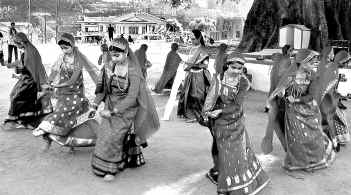Kodava Sahitya Academy makes suggestions on `Ummathat’

Madikeri :
Kodavas have a unique culture and their folklore too is distinct from others. “Ummathat”, a special dance, a mixture of folklore with a dainty touch of medieval and modernity, performed by Kodava women, is a case in point.
Kodava women lag behind in variety of dances vis-a-vis men. Men attired in traditional costumes perform “Bolakkat”, “Peeliyat”, “Chowriyat”, “Kappeyat”, “Pareyakali”, “Kolatt”, and “Kombatt” whereas women dressed in colourful saris perform “Ummathat”.
There was a debate whether these dances should be performed in public or only at Kodava religious and cultural ceremonies.
The Karnataka Kodava Sahitya Academy, which had organised a seminar on “Ummathat” at Devanageri in Virajpet taluk recently, has come up with some suggestions concerning “Ummathat”. A decision was taken to maintain a uniform pattern of “Ummathat” in future.
Some of the suggestions are: Ummathat should not be performed in open or public functions or in front of the tableux as it loses sanctity. The dance shall be performed only in venerable places. Dancers shall remove footwear, wear traditional “bottu podiya” (a grand sari with rich brocade) while performing the dance.
The songs, an assortment of over 12 songs, sung in different tunes, will be retained without giving it a touch of modernity, was another decision taken at the seminar.
The “taleyatakki bolakk”, a brass plate containing a burning lamp sprinkled with rice, will replace the woman dressed up as Goddess Cauvery in the middle. The seminar arrived at a decision to formulate enough programmes in future to foster “Ummathat”.
Pace and rhythm
Akhila Kodava Samaja president Matanda C.Monnappa agrees with most of the suggestions that “Ummathat” must be nurtured. There ought to be a touch of modernity to go with it, he says. Increasing the pace of songs to match the rhythm will make it more attractive. At the same time, changes should not dilute the original nor affect the decorum of the dance. It should not portray women in poor light.
No one is sure of the origin of the songs or the nuances of “Ummathat”. Most people believe the songs were compiled by the late Haradasa Appacha Kavi several decades ago. Certain songs are contained in the book written by Kavishishya Haridasa Mukkatira S. Poovaiah. Late Puggera Karumbaiah, who was instrumental in reviving the “Ummathat” in the early Seventies, too had contributed to the dance form.
Origin of Ummathat
According to Puggera Aiyappa, a senior citizen from Devanageri, Ummathat was practised centuries ago though there are no records available to prove it. Mr. Monnappa says his 95-year-old mother (who passed away recently) used to sing “Ummathat” songs.
Other dances performed by men such as “Bolakkat” have religious sanctity. Bolakkat is offered to the deity unlike “Ummathat”, Mr. Monnappa said.
Similarly, dances such as “Peeliyat”, “Chowriyat” and “Kombatt” are performed at the religious places where the deities are worshipped. “Ummathat” and “Bolakkat” were performed in public in the past even in New Delhi. It had drawn criticism.
source: http://www.thehindu.com / The Hindu / Home> Karnataka> Madikeri / by Staff Correspondent / July 20th, 2005

